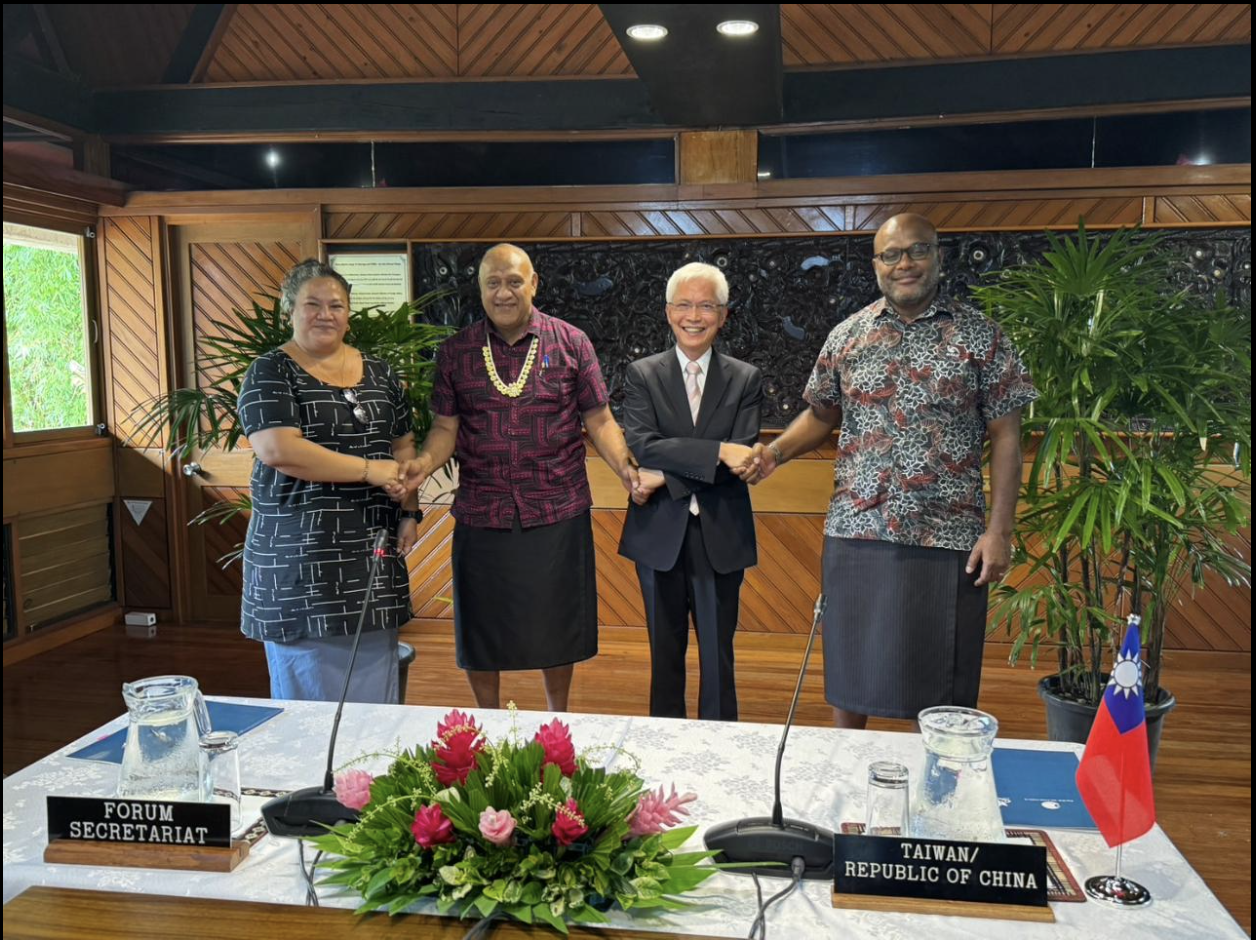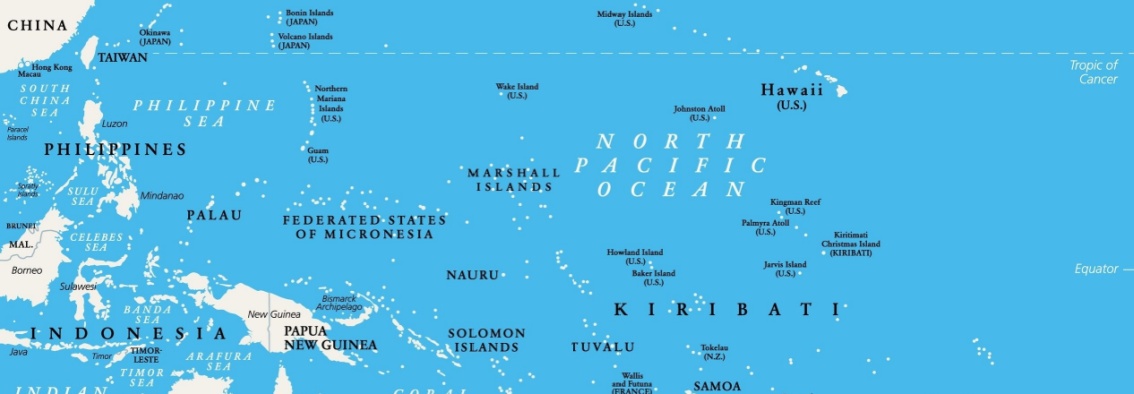For the Pacific Islands region (also known as Oceania), which includes countries like Fiji, Samoa, and Tuvalu, the Pacific Islands Forum (PIF) is undoubtedly the most important regional organization. PIF creates venues where Pacific Island countries gather to make and issue communal decisions on regional and international issues, and most of the Pacific’s significant statements on climate change, sovereignty, statehood, and a range of other matters are released through PIF. The annual PIF Leaders Meeting is the premiere decision-making venue for Pacific leaders, with decisions reached at the meeting channeled into international fora like the United Nations General Assembly.
However, Pacific leaders are not the only attendees at PIF Leaders Meetings. This is where Taiwan comes into the picture. Typically, dialogue partners, or countries that “strategically engage with the Pacific Islands Forum,” are also able to attend the meeting (although, of course, some parts of the meeting are open only to Pacific leaders). China is classified as a dialogue partner, as are the United States and 19 other countries. Although it is not identified as a dialogue partner, Taiwan is a “development partner” and participates under the name “Taiwan/Republic of China.” Typically, this means that Taiwan can send representatives to major PIF meetings where these representatives interact mainly with the Pacific Islands that recognize Taiwan (Tuvalu, Palau, and Marshall Islands, as of September 2025). This arrangement is based on a 1992 PIF Leaders decision on relations with Taiwan, where leaders agreed that a “Taiwan/Republic of China-Forum Countries Dialogue” would be held at the PIF Leaders Meeting venue and countries could attend at their discretion.

Image: Representatives from the Pacific Islands Forum Secretariat and Taiwan signed a new cooperation agreement to support ocean governance in February of this year. (Image source: Taipei Trade Office in Fiji)
Conflicts Over Taiwan’s Attendance at PIF Leaders Meetings
In the past, PIF Leaders Meetings have resulted in conflict between that year’s Pacific host country and China and/or Taiwan. For example, during the 2024 meeting in Tonga, the first edition of the meeting communiqué posted online included text confirming the 1992 Leaders decision on relations with Taiwan. China’s Special Envoy for Pacific Island Countries Affairs, Qian Bo (錢波), expressed opposition to the language, and a new version of the communiqué text was later posted with all references to Taiwan removed. The PIF Secretariat defended itself by noting that the text referencing Taiwan had not been the final version of the communiqué, which is what prompted the second version of the text to be posted. Many Pacific leaders and analysts have viewed these incidents as unfortunate distractions from the work of PIF on issues that are actually important to the Pacific, like climate change.
The year 2025 has proved no exception in this trend of Taiwan-China clashes at PIF Leaders Meetings. The 2025 meeting was held from September 8 to 12, and the host was Solomon Islands, a country that maintained diplomatic relations with Taiwan until 2019, after which it developed extremely close ties with China. In 2022, Solomon Islands signed a security agreement with China despite pleas and threats from the United States and others to take a different course. Solomon Islands’ then-Prime Minister Manasseh Sogavare subsequently refused to attend the second United States-Pacific Islands Forum Summit in Washington, DC in 2023, in order to avoid a “lecture” from the United States. During the 2024 PIF Leaders Meeting, Solomon Islands also reportedly tried to strip Taiwan of its development partner status within PIF.
Before the 2025 meeting, news began circulating in June and July that Solomon Islands was denying visa applications lodged by members of the Taiwan delegation preparing to attend the event. Subsequently, Taiwan’s Pacific allies began expressing their opposition to a PIF Leaders Meeting where China and other dialogue partners would be present but Taiwan would not, and the prime minister of Solomon Islands Jeremiah Manele had to make a choice. He ultimately decided to disinvite all dialogue and development partners from the meeting, justifying this by explaining that a review of Pacific regional architecture had not yet been completed, and it would not be appropriate for dialogue and development partners to attend. The 2025 meeting would be just for Pacific Island countries.
Few countries were fully satisfied with this approach, especially because the United States and China (as well as other dialogue partners) have embassies in Solomon Islands and could still potentially organize bilateral meetings with Pacific leaders attending the 2025 meeting. Meanwhile Taiwan, which does not have representation in Solomon Islands, could not. The United States supported Taiwan’s attendance at the meeting, and, for a period of time, Taiwan’s ally Tuvalu threatened not to attend if Taiwan could not participate. Another PIF member, New Zealand, also voiced dissatisfaction with Manele’s decision. Although by the end of the 2025 meeting, PIF Leaders eventually confirmed Taiwan’s place as a development partner, conflict over Taiwan’s participation loomed over preparations for the event.
How Conflicts Over Taiwan’s Attendance at PIF Leaders Meetings Help Taiwan
What happened to Taiwan at the 2025 PIF Leaders Meeting amounts to what I would call a small-scale rejection. Prime Minister Manele’s exclusion of Taiwan was not an indefinite expulsion from PIF Leaders Meetings, but was drastic enough to garner widespread attention. I posit that Taiwan’s exclusion (along with all other dialogue and development partners) from the 2025 PIF Leaders Meeting—and any other small-scale rejections Taiwan has faced at PIF meetings over the years—helps rather than hurts Taiwan’s official and unofficial diplomacy in the Pacific. The fact that the final communiqué for the 2025 PIF meeting included a reaffirmation of the 1992 PIF Leaders decision that allows Taiwan to engage with PIF members is a testament to this idea.
If Taiwan is allowed to participate at a Leaders Meeting with no complaints or drama from the host country or China, it can assert a regional presence in the Pacific but, in practice, its engagement at the meeting is centered on its allies at events held on the sidelines. Yet, when Taiwan is rejected from a meeting or its name is withheld from a communiqué, it can have a much more expansive regional impact, and the disadvantage is really to China instead of Taiwan for the following three reasons:
Perceptions of China as a bully turn sympathy towards Taiwan
When Taiwan experiences small-scale rejections at PIF Leaders Meetings, China is perceived as bullying not only Taiwan but also Pacific Island countries. When Solomon Islands excludes Taiwan from a meeting, other leaders and analysts wonder if this is what the Pacific Island country really sought to do or whether such action was forced by China. In their histories, Pacific Island countries have experienced colonization and suppression by European powers. After gaining their independence (or continuing to fight for self-determination), these countries do not welcome being pushed around by yet another power. That China can bully Taiwan in the Pacific reminds PIF members that the balance of power is not in Taiwan’s favor, a recognition that can give way to widespread sympathy. It sets off alarm bells that China may be a dangerous and risky partner despite the large amounts of aid it can provide to Pacific nations.
Desire for consensus and congeniality at PIF meetings prompts even China’s allies to defend Taiwan
When Taiwan experiences small-scale rejections at PIF Leaders Meetings, it is not simply Taiwan’s Pacific allies that come to its defense—China’s allies also speak on Taiwan’s behalf. In the run-up to the September 2025 PIF Leaders Meeting, Samoa—which does not recognize Taiwan—threatened to boycott the meeting if Taiwan was not allowed to attend. After the prime minister of Solomon Islands decided to exclude all dialogue and development partners from the meeting, Fiji, New Zealand, and Papua New Guinea, none of which recognize Taiwan, expressed disappointment with the exclusion of PIF partners (although they may not have specifically named Taiwan). In the past, PIF has experienced disruption and members have even withdrawn when consensus and collegiality, which are seen as critical to Pacific methods of decision-making, have not been maintained. Consequently, when Taiwan’s attendance at a PIF Leaders Meeting is challenged, this is viewed as threatening PIF members who have official relations with Taiwan and, by extension, PIF’s unity and stability. Given this, even Pacific countries that recognize China may support Taiwan if this helps to maintain congenial relations with Taiwan’s Pacific allies.
Excluding Taiwan focuses attention on Taipei’s messaging
When Taiwan’s name is removed from a PIF communiqué text, there is friction about Taiwan meeting with its allies at a PIF Leaders Meeting, or Taiwan is excluded from a meeting, attention turns to Taiwan. Media outlets explain Taiwan’s unique situation repeatedly and discuss why Taiwan experiences conflict with China, why it is typically able to attend PIF Leaders Meetings despite protests from China, and which countries support Taiwan. Media outlets closely track Taiwan’s statements about PIF and boost them. As one example, in 2025, New Zealand’s public broadcaster Radio New Zealand published statements from Taiwan’s Ministry of Foreign Affairs calling for Taiwan’s participation at the 2025 Leaders Meeting. Therefore, even when Taiwan is excluded from a PIF Leaders Meeting, it becomes one of the stars—along with China. As Pacific analysts have noted, issues like Taiwan-China competition distract from Pacific priorities and the “real tragedy lies in the fact that this so-called ‘divisive issue’ is neither of our making, nor particularly central to our own strategic or developmental priorities.” Yet, the attention is undoubtedly good for Taipei because it keeps Taiwan in the Pacific public eye and continues to educate the public about why Taiwan does not view itself as part of China.
Conclusion
If Taiwan were to be stripped of its position as a PIF development partner and blocked from all future meetings of PIF Leaders, this would be disastrous for Taiwan and its foreign policy in the Pacific. Although Taiwan might continue to maintain official bilateral relations with some countries, complete removal from PIF would essentially erase Taiwan’s presence at the regional level. It would also enable and empower China to strengthen its relationship with the broader Pacific region and finalize multilateral agreements it has attempted to push in the past.
However, if Taiwan remains a PIF development partner while suffering myriad small-scale rejections and setbacks, this instead reinforces Taiwan’s place as a multilateral actor at the regional level. Although (or, perhaps, because) Taiwan was excluded from the 2025 PIF Leaders Meeting, the final communiqué for the meeting reaffirms Taiwan’s place as a development partner even though only three of the 18 PIF member countries recognize Taiwan. Even as nations succeed in removing Taiwan from a communiqué text, they fail to keep the removal quiet, and even as they attempt to exclude Taiwan from a Leaders Meeting, they ultimately have to exclude all other partner countries and inadvertently cause an official decision to be made supporting Taiwan’s participation at PIF. In an uncertain diplomatic environment where Taiwan has dwindling official support, small-scale and clumsy rejections boost Taiwan’s presence in the Pacific more than they erase it.
The main point: Taiwan was excluded from the 2025 PIF Leaders Meeting, which is a critical annual meeting for the Pacific region. However, the minor slights and inconveniences Taiwan has sometimes endured at this forum can actually strengthen, rather than weaken, Taiwan’s position in the Pacific.




